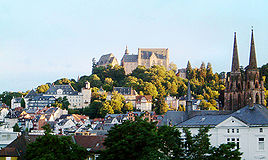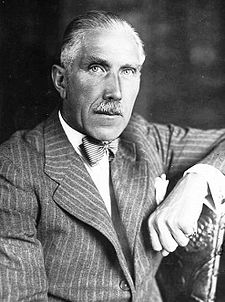
Marburg speech
Encyclopedia


Franz von Papen
Lieutenant-Colonel Franz Joseph Hermann Michael Maria von Papen zu Köningen was a German nobleman, Roman Catholic monarchist politician, General Staff officer, and diplomat, who served as Chancellor of Germany in 1932 and as Vice-Chancellor under Adolf Hitler in 1933–1934...
at the University of Marburg on June 17, 1934. It is said to be the last speech made publicly, and on a high level, in Germany against Nazism
Nazism
Nazism, the common short form name of National Socialism was the ideology and practice of the Nazi Party and of Nazi Germany...
.
Papen, encouraged by President Paul von Hindenburg
Paul von Hindenburg
Paul Ludwig Hans Anton von Beneckendorff und von Hindenburg , known universally as Paul von Hindenburg was a Prussian-German field marshal, statesman, and politician, and served as the second President of Germany from 1925 to 1934....
, spoke out publicly about the excesses of the Nazi
Nazism
Nazism, the common short form name of National Socialism was the ideology and practice of the Nazi Party and of Nazi Germany...
regime, whose ascent to power, 17 months earlier when Adolf Hitler
Adolf Hitler
Adolf Hitler was an Austrian-born German politician and the leader of the National Socialist German Workers Party , commonly referred to as the Nazi Party). He was Chancellor of Germany from 1933 to 1945, and head of state from 1934 to 1945...
became chancellor of Germany, had been assisted measurably by Papen. In his speech von Papen called for an end of the Nazi terror and the clamoring for a "second revolution" by the Sturmabteilung
Sturmabteilung
The Sturmabteilung functioned as a paramilitary organization of the National Socialist German Workers' Party . It played a key role in Adolf Hitler's rise to power in the 1920s and 1930s...
(SA – the Nazi Party storm troopers), and a return to dignity and freedom. He also stated: "The government [must be] mindful of the old maxim 'only weaklings suffer no criticism'".
The speech was drafted by one of Papen's close advisors, Edgar Julius Jung
Edgar Julius Jung
Edgar Julius Jung was a German lawyer born in Ludwigshafen, in Rhineland-Palatinate, Germany. He was a leader of the Conservative Revolutionary movement in Germany, which stood not only in opposition to the Weimar Republic, whose parliamentarian system he considered decadent and foreign-imposed,...
, with additional assistance by Papen's secretary Herbert von Bose
Herbert von Bose
Herbert von Bose was head of the press division of the Vice Chancellery in Germany under Vice Chancellor Franz von Papen.- Imperial Germany and Weimar Republic :...
and by Erich Klausener
Erich Klausener
Erich Klausener was a German Catholic politician who was murdered in the Night of the Long Knives as the Nazis purged their opponents.- Biography :...
. It was delivered in the Landgrafenhaus, the 1920s neo-rococo
Rococo
Rococo , also referred to as "Late Baroque", is an 18th-century style which developed as Baroque artists gave up their symmetry and became increasingly ornate, florid, and playful...
classroom building of the university, in the main lecture hall. The hall is still there today, including the original furniture (Room 101 of what is now one of the two buildings of the Law School), but there is no plaque or any other form of commemoration of the Papen speech.
The speech made Hitler furious, and propaganda minister Joseph Goebbels
Joseph Goebbels
Paul Joseph Goebbels was a German politician and Reich Minister of Propaganda in Nazi Germany from 1933 to 1945. As one of Adolf Hitler's closest associates and most devout followers, he was known for his zealous oratory and anti-Semitism...
attempted to suppress it. Angered by the blocking of publication of his speech, Papen insisted he had spoken on behalf of Hindenburg, threatened to submit his resignation from Hitler's cabinet, and promised to inform Hindenburg of the suppression of his speech.
Two weeks later, on the Night of the Long Knives
Night of the Long Knives
The Night of the Long Knives , sometimes called "Operation Hummingbird " or in Germany the "Röhm-Putsch," was a purge that took place in Nazi Germany between June 30 and July 2, 1934, when the Nazi regime carried out a series of political murders...
, the SS
Schutzstaffel
The Schutzstaffel |Sig runes]]) was a major paramilitary organization under Adolf Hitler and the Nazi Party. Built upon the Nazi ideology, the SS under Heinrich Himmler's command was responsible for many of the crimes against humanity during World War II...
and Gestapo
Gestapo
The Gestapo was the official secret police of Nazi Germany. Beginning on 20 April 1934, it was under the administration of the SS leader Heinrich Himmler in his position as Chief of German Police...
murdered Hitler's enemies within the Nazi Party, as well as various past friends and associates to whom his relationship might prove awkward, and several conservative opponents of Nazism. During this blood purge Jung, von Bose, and Klausener were also killed. Papen's office was ransacked and he was himself held under house arrest, but his life was spared. Papen's resignation as vice chancellor was accepted after the purge was over. Papen would later serve as a diplomat until 1944, and played no further political role.
Literature
- "Rede des Vizekanzlers von Papen vor dem Universitätsbund, Marburg, am 17 Juni 1934", in: Edmund Forschbach: Edgar J. Jung. Ein konservativer Revolutionär 30. Juni 1934, 1984, p. 154ff.
- "Rede des Vizekanzlers von Papen vor dem Universitätsbund, Marburg, am 17 Juni 1934", in: Sebastian Maaß: Die andere deutsche Revolution. Edgar Julius Jung und die metaphysischen Grundlagen der Konservativen Revolution, 2009, p. 134ff.
- "Vice-Chancellor Franz von Papen's Marburg Speech: A Call for More Freedom, June 17, 1934" (English-language translation), in: Louis L. Snyder, editor: Hitler's Third Reich; A Documentary History, Chicago: Nelson-Hall, 1981. pp.173-177.

